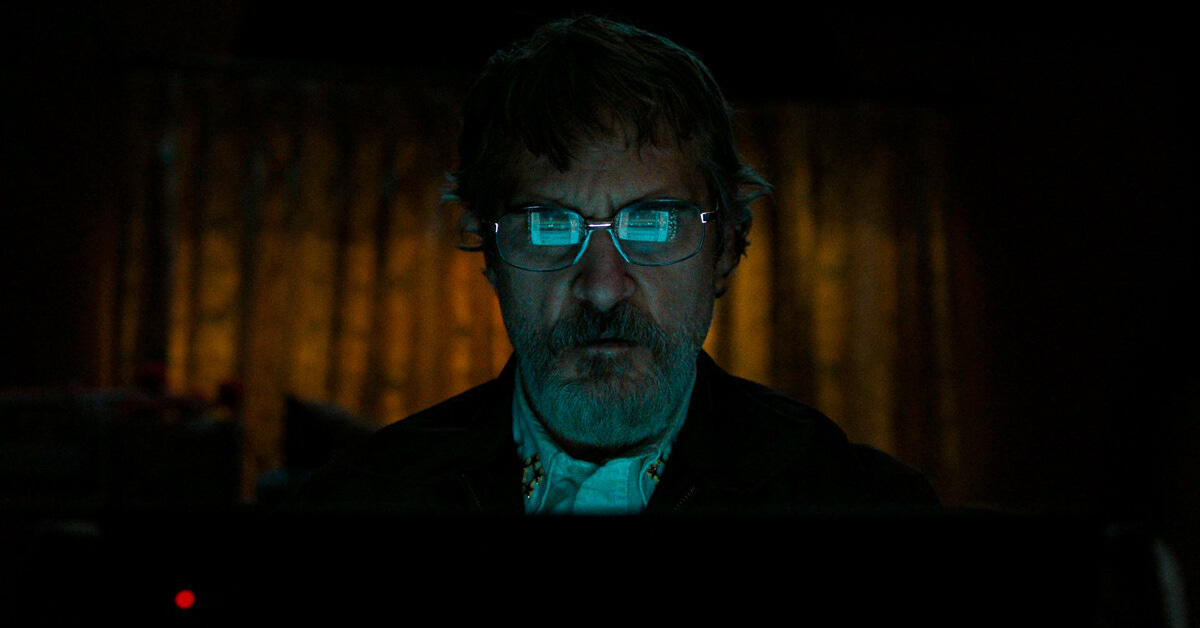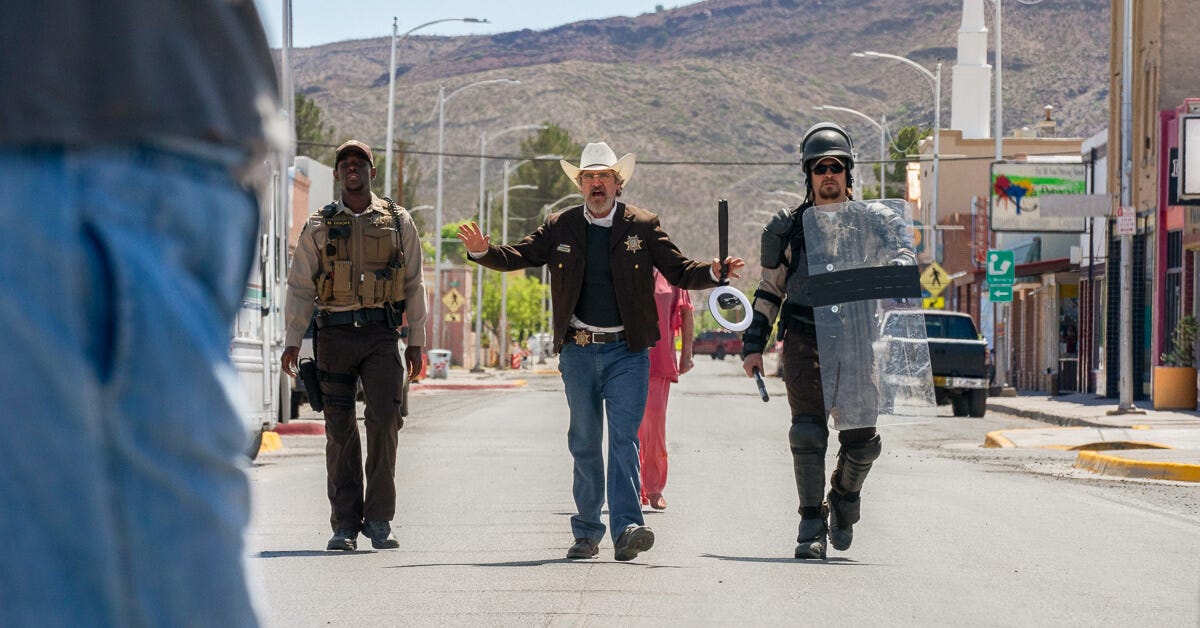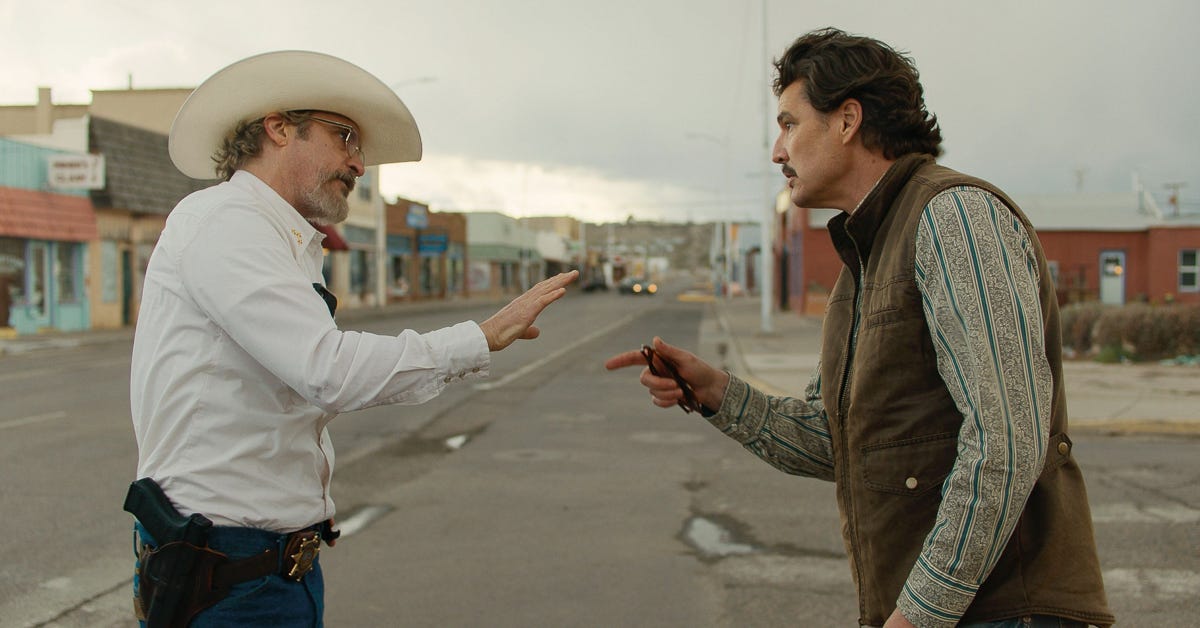🎧 [PLAYBACK: SOUND ON]
Smash play and step into Ari Aster’s pot-boiling Southwestern dreamscape.🟢 For the full stream, open the soundtrack on Spotify while you read.

Mirror, Mirror
Satire is apt to be broadly misinterpreted. Just ask Paul Verhoeven.
But it can be an invaluable tool to deconstruct familiar patterns and shine light upon whatever deserves a little constructive criticism.
Good satire also functions as a societal mirror. A mirror aimed at the audience, typically reflecting a version of reality that flatters their own perspective.
Truly great satire threads a near-impossible needle — widening the frame far beyond expectation, spotlighting not just our particular worldview but playfully offering a 360-degree vision that also catches our own reflection.
And we might not always like what we see.
There’s a reason why when we view photographs of ourselves, they often don’t align with our perception of what we see reflected back at us in the bathroom mirror each morning. It’s called mirror image perception bias (or the “mere-exposure effect”).
We’re used to seeing ourselves from a subtle, yet crucially different way than others do.
The mirror’s angles and inversion train us to see ourselves through a single, distorted lens. As a result, seeing ourselves through someone else’s eyes can often be a bit psychologically jarring at first.
Hence, the rise of the “mirror selfie” — a self-palatable capture of how we’ve internalized our image and grown comfortable with it, even if our friends may recognize it as a little “off.” Because to them, it is. But as visual confirmation bias for us, it holds the very same appeal as partisan news coverage, slyly manipulative podcasts, or internet echo chambers.
It’s our own reality as we want — and increasingly demand — to see it.
It’s Gonna Be a Bumpy Night
What writer/director/indie-darling Ari Aster has constructed in Eddington is simply put one of the sharpest, most fascinatingly layered, and boldly ambitious satires of the last decade.
It’s bound to upset an awful lot of people — and not just the usual suspects — by design. But that’s precisely what the art form of satire is intended to do.
Mocking society in one dimension is expected and easy. Satirizing it in full, including the target audience, is risky narratively, technically, and commercially. And therein lies both the paradoxical genius and the dare.
Watching Eddington, I was giddily reminded of peak Robert Altman or Paul Thomas Anderson.
Aster spryly takes what, on the surface, appears to be a simple tale about conflicting personalities in small-town Americana and spins it into a diatribe on practically every possible aspect of our current, shared existence as humans.
What looks like surface-level political commentary instead hides a breathtaking satirical scope.

It’s About EVERYTHING
The inspired setting is Eddington, New Mexico: May 2020.
A small-town microcosm with big-time personalities. Neither desolate nor urban. A “border town” in every conceivable aspect of the term.
Eddington, NM, is a multi-ethnic, multi-cultural community that lies on the immutable border of settler outpost and self-governing Native American territory, uncoincidentally located in a deeply purple state on the political map, on the eve of a massive tech conglomerate opening a new AI server farm on the edge of town, bringing promises of jobs and relevance — and threats of ecological pillage and generational divide.
Eddington is a town fractured along every conceivable line: politically, socio-economically, ethnically, religiously, intellectually, generationally… you name it. If there’s a societal division to be had, it’s reflected here in some way. Sometimes (perhaps too) overtly, oftentimes impressively elegantly.
Framework, Not Flashback
As nearly everyone on this planet is painfully familiar, the COVID-19 pandemic was a surreal, scarring experience that permanently marked those who lived through it, but it also exacerbated ever-growing polarizations throughout society, inadvertently fueled (at least, in part) by tech’s rise.
The confluence of COVID and social media magnified both the benevolence, kindness, and shared altruism that humanity is amazingly capable of, as well as the self-centeredness, ignorance, and arrogance that mark our deepest, darkest impulses.
It lit these inherent humanistic attributes ablaze and made us stare horrified into the conflagration. Which side did we see ourselves on? That depends on which side of the mirror we’re looking at.
So to use that framework (and that’s all it is, a framework) as a narrative device for a tale ambitious enough to take on our entire post-2020 psyche. A total pro move, Aster.
Blind Spots in Plain Sight
I strolled into Eddington largely blind and highly recommend you do the same. There’s so much to unpack — but alas, spoilers abound. We’ll save that for a future Ctrl+Alt+Decode column.
On the performance front, this is yet another nearly one-man show for Oscar-winner Joaquin Phoenix as Eddington’s headstrong sheriff. He’s expectedly terrific in what was surely a challenging role both emotionally and physically.
Pedro Pascal continues to amaze in an admittedly less showy but still highly effective turn as the town mayor and Phoenix’s lifelong arch-nemesis on multiple fronts.
Emma Stone, again (love her!), is wonderful in a surprisingly small role. That’s not remotely a spoiler, but while she only gets 10–15 minutes of screen time, they land with deliberate force and graceful restraint.
A nearly unrecognizable Austin Butler also shines in another brief, but pivotal role as an enigmatic cult leader spewing vile diatribes of conspiracy theory and disinformation to sycophantic crowds online and on tour.
But away from the cameras, he presents as silky smooth and charmingly charismatic — revealing just the levels to which his con on his audience is played. If Mickey 17 or, god forbid, Megalopolis, felt like parody by bulldozer, Eddington is satire with a scalpel, dissecting our societal cadaver in real time.
Every performance lands. Luke Grimes (Yellowstone) and British breakout star Michael Ward (Empire of Light) round out the sheriff’s trio, each increasingly out of depth as societal pressure mounts, while Deirdre O’Connell (The Penguin) brings just the right dose of paranoid delusion as Phoenix’s live-in mother-in-law.
This Town Ain’t Big Enough
Eddington is a genreless experiment mostly because it needed to be in order to cast its net so widely with success.
Think of it like Short Cuts by way of The Hunt.
As such, even the thematic framework beautifully mirrors the scope of what Aster’s assembled as an unimaginable compendium of satirical targets.
Part suspense drama, part frontier western, Eddington also manages to be incredibly funny and shockingly violent.
Cinematographer Darius Khonji (Mickey 17, Se7en) trains his camera with delightful precision, playing with angles and movements that forge meaningful contribution without emerging as showy.
The dual score by Daniel Pemberton (Spider-Man: Into the Spider-Verse) and Bobby Krlic, a.k.a. The Haxan Cloak (Midsommar, Beau Is Afraid), is a masterstroke of minimalist tonal balance.
Pemberton lays the melodic scaffolding — playful, propulsive, genre-aware. Krlic slices through it with eerie diligence, dragging tension to the surface like an exposed nerve.
The Coda Conundrum
Overall, Aster’s ambition is plainly visible but brilliantly layered in its simplicity.
Much like The Brutalist earlier this year, the quality of filmmaking on display makes the movie buzz by despite pushing 2.5 hours. That said, Eddington likely would’ve benefitted from a slight 10-15 minute trim, particularly to its final act.
While I was almost sure I knew where Aster was going to end his tale (and was 100% on board in anticipation), that moment came and went as he took us into an extended finish verging on the “didactic coda” — whereby a filmmaker unfortunately spells out what they’d already artfully shown — flirting dangerously close to overstepping the boundaries of all the smart subtlety that came before it.
It’s as if he said, “This is to spell it out for the back row who sat through all of this and yet somehow still didn’t get it.”
Like any great satire, Eddington dares you to find yourself somewhere within it.
Maybe your theater companion sees you in an entirely different character than you do. That discomfort you may feel rising up in the pit of your stomach?
That’s the entire point of great satire.
If you walk out angry at or dismissive of Eddington, congratulations, because Aster anticipated that reaction too and mocks it head-on. And if you still miss your perhaps uncomfortably inverse reflection staring you in the face, well, that’s on you.
REFLECTIONS IN BROKEN GLASS:
+ 3 points for best use of social media on film since Zola
- 2 points for not ending where it so clearly should’ve… even if he were just playing with our expectations. And good for him.
+ 5 points for a subtle, last-minute cameo that I’m sure won’t land for most. (Hint: look at the Zoom screen.)
+ 10 points for daring to piss off everyone, only to sit back and watch the fireworks display unfold
Top 10 of the year-type stuff.
SINemeter Judgment: TESTAMENT
📊 [PLAYBACK: RECEPTION]
Production Budget: $35M (estimated)
U.S. Theatrical Release: 2,111 theaters (wide)
Key Competition: Fantastic Four: First Steps, Superman, Jurassic World Rebirth, F1: The MovieOpening Weekend: $4.3M
Opening Rank: #6
Worldwide Box Office: $11.6M
Cinema DEFCON Threat Assessment:
Theatrical to streaming window: 25 days
July 18 - August 12
DEFCON 2
Verdict:
As predicted, despite critical acclaim, the narrative risk of forcing everyone to stare at their own reflection from every angle resulted in a massive box office flop.
No one wanted to see it (or relive COVID, for that matter).
Sad. But perhaps there’s a solve for that somehow.
🎬 [PLAYBACK: TRAILER]
Check out the original theatrical trailer. It’s thankfully pretty spoiler-free.









